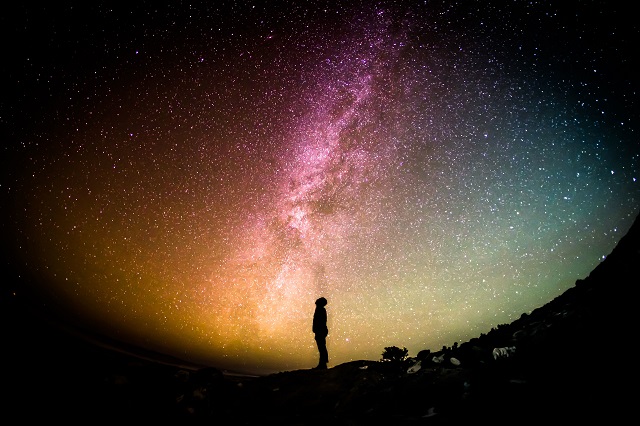
I was sitting in my mother’s living room when I heard the faint shuffle of mail coming through the letter box.
I got up to retrieve the delivery and saw an invitation to a local evangelical church to discuss a pretty heavy topic—what happens to us after we die? I was intrigued by their request to discover if this tough question could be answered.
I decided to go.
The service lasted just over an hour, and truthfully, that was more than I could handle. There was no discussion about life after death as the flyer had advertised. Instead, I was fiercely preached to about heaven and hell, and sin, and how every person is born a sinner and must receive Jesus Christ as his savior. I grappled with the idea that a precious, newborn baby is a sinner and found that I could not accept this as fact.
That experience took me back to my childhood and Christian upbringing when every night, I would say two prayers before bed.
First, I would recite the classic children’s bedtime prayer:
“Now I lay me down to sleep, I pray the Lord my soul to keep. If I die before I wake, I pray the Lord my soul to take. Amen.”
My second prayer was a bit longer. One by one, I would state the names of each member of my family and ask God to protect and keep them safe, and provide them with a healthy and happy life. I was so superstitious that I couldn’t comfortably fall asleep until I had declared every last word of my prayers. So often I felt tired and burdened by the lengthy prayer and had to muster up all my energy just to complete it out of fear that something bad might happen if I didn’t.
Yes, I was brought up in a typical Christian family, and attended a Christian school. I sang Christian hymns during the school assemblies and even performed in the Christmas nativity plays every year. My parents carefully took their time to teach me about Jesus Christ and urged me to live my life based on their belief system. Of course being so young, I didn’t think to question the dogma they were instilling in me. My life seemed completely normal.
I can’t really pinpoint the exact time I stopped believing in God and don’t recall a singular event that made me change my beliefs—the change was gradual as I grew older.
Ever since I can remember, I would gaze up at the sky wondering what all that vast space above me consisted of, seeking its significance. It wasn’t until I entered teenagedom that I began to take an interest in science, learning about the stars and the sun. Did you know that stars are suns and planets orbit them just like our sun? Just in our enormous galaxy alone are billions of sun-like stars! And further beyond our galaxy, in the observable universe, is an estimated 100 billion galaxies! On that scale, we are but a teeny, tiny spec of dust!
I racked my brain out searching for answers to deep questions that no one seemed to know the answers to.
Where does God fit into all this, and does he reign over the entire universe? What about the gods that others worship? Is there one true God? Which belief system is the one to believe? If I were born in Afghanistan instead of Scotland, would I be Muslim? Would I be Hindu if I were born in Nepal? I was confused as to why my birthplace should dictate which god presided over me.
Then there are those who feel so strongly about their beliefs that they exhibit extreme, harmful behavior by terrorizing those with opposing views—by committing mass murders that shake the world. I am concerned for my safety and others every time I board a plane. Things as simple and fun as attending a summer concert or going dancing at a nightclub bring up insecurities of being free from harm. Anything could happen just being outside!
Science and Religion
What would the world look like if there was no religion? What if we based our life on scientific findings? How would the world look? How would personalities differ? How would people live their lives?
Science is all around us from our health care to our smart phones. Why do some depend so deeply on this science but turn their back on other scientific discoveries?
One of the main conflicts between science and religion is evolution.
After a five-year science expedition on board the HMS Beagle from 1831 to 1836, Charles Darwin presented an idea that would challenge the way we understand our existence forever: Evolution by natural selection.
Darwin discovered that there was a wide variation of individuals within a species. (I’m sure you can think of two people who are very different from each other.)
This variation is caused by small differences in genes. Individuals who are most likely to survive and reproduce are those most suited to their environment.
The genes that are granted this success will then be passed on to their offspring. If the individual is inadequately adapted to their environment, they have less chance of survival and reproduction.
As a result, this means their genes are less likely to be passed onto their offspring. Therefore, over time the species will slowly begin to evolve.
In contrast, the Christian accounts of how life manifested on Earth can be found in the first two chapters in the Bible, in the book of Genesis.
In the event you don’t already know the story, the Bible suggests that the Earth and every living creature was created in seven days.
“Now out of the ground the Lord God had formed every beast of the field and every bird of the heavens and brought them to the man to see what he would call them. And whatever the man called every living creature, that was its name.” ~ Genesis 2:19
I understand that as science has advanced, many Christians now incorporate the evolutionary theory into their beliefs. Yet, others believe only what is written in the Bible and hold that evolution is not true.
Personally, I don’t believe in an afterlife. I believe once I die, I am gone. I will return to earth, the earth that has been here for billions of years before my heart took its first beat.
People may argue that this is a grim way to look at life.
However, I will argue back that it’s not. I don’t believe when I die I will go to a magical place where all my dreams will come true.
I believe we’re already living in a magical place and that all my dreams can come true, here.
The mere fact that I was born, that I am alive and breathing, typing my thoughts onto a laptop screen is profoundly magical in every way.
The most harrowing concept of my beliefs is the realization that I will never see my loved ones again after they, or I, die. Knowing this makes me cherish my friends and family by spending more time with them and expressing my love to them every day.
Religion in Decline
I can’t help but take notice of the great shift in my own country when it comes to religious views. Recent studies suggest that the number of people who identify as non-religious is increasing rapidly. The 2015 Commission on Religion and Belief in British Public Life report contains information collected over two years and concludes that almost half of the British population describes itself as non-religious. Compare this to a third in Scotland and an eighth in England, in 2001.
Christian affiliation is also in decline with only two in five Brits identifying themselves with the religion—compared to two in three, 30 years ago.
It’s difficult to say with accuracy the reason Britain has had this shift; I can say why I had my own, however, and that was by acquiring new knowledge. I learned what was happening on my planet and what was happening beyond it.
I understand many people find comfort in faith. Perhaps it helps them through challenging times and gives them purpose. I respect that.
Believing in a higher power has given humans a way of seeking answers and comfort for thousands of years.
But, now in 2016, we have the scientific capability to start answering questions in a different way.
The Future
We should no longer be afraid to speak what we truly believe.
I choose to understand the world in my own way, answer my own prayers and live life to the fullest that I’m capable—because I know it’s my only one.
There is someone who looks over me, knows all my thoughts, picks me up when I have fallen, forgives me when I make mistakes and pushes me to do better.
And that person is me.
~
Sources:
Charles Darwin: Evolution and the story of our species.
Darwin, Charles. The Origin of Species. New York: Random House Value Publishing, 1979. Print.
Commission on Religion and Belief in British Public Life.
~
Author: Suzan Martin
Image: Greg Rakozy/Unsplash
Apprentice Editor: Sarah Shin; Editor: Travis May











Read 1 comment and reply